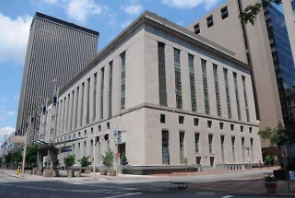By Tom Latek
Kentucky Today
The Sixth Circuit Court of Appeals has affirmed the constitutionality of the contribution and gift bans in the Kentucky Code of Legislative Ethics.
The three-judge panel ruled on Thursday that the measures “enacted to prevent corruption and protect its citizens’ trust in their elected officials, comport with the Constitution,” and reversed a lower court ruling, which had struck down the contribution and gift bans from lobbyists to legislators, in response to a lawsuit filed by Sen. John Schickel, R-Union.

The U.S. Sixth Circuit Court of Appeals upheld a ruling on a ban of gifts to lobbyists. (U.S. Government photo)
The Legislative Ethics Commission was successfully defended by the Office of the Kentucky Attorney General.
“One of the most important purposes of the legislative ethics law is to forbid legislators from soliciting things of value or campaign contributions from lobbyists,” said Judge Anthony Wilhoit, Chairman of the Ethics Commission. “This decision is a clear win for the integrity of the legislative process, as emphatically recognized by the Court of Appeals.”
In response to the Boptrot scandal, when 17 lawmakers, staffers and lobbyists were convicted on federal corruption charges, the General Assembly passed sweeping ethics reforms in 1993 which included restrictions on campaign contributions from lobbyists and their employers to legislators. In 2014, the Kentucky General Assembly enacted a “no cup of coffee” ban in Kentucky’s ethics law, which further strengthened the law and continues to keep the legislator/lobbyist relationship on a professional basis.
In the 26 years since the 1993 enactment of the legislative ethics law and the creation of the independent, citizen-run Legislative Ethics Commission, no Kentucky legislator has been indicted or convicted for misusing his or her legislative office. This stands in marked contrast to the experience of many other states, where legislators are often investigated, indicted, and convicted of public corruption.
Schickel hasn’t said if he will appeal the ruling to the U.S. Supreme Court.
















